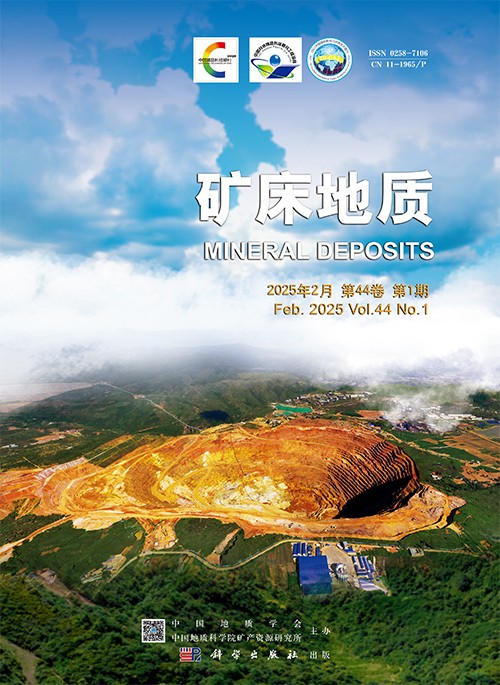摘要点击排行前10名
全文下载排行前10名
裴荣富院士诞辰101周年纪念专辑
- 初论裴荣富院士的矿床成因“系统论”学术思想 []
张洪涛 - [摘要] [HTML] [PDF]
- 大陆成矿学的研究前沿与关键科学问题 [3]
翟明国 - [摘要] [HTML] [PDF]
- 矿业可持续发展若干问题 []
张洪涛,舒思齐,孙张涛,黄嘉润 - [摘要] [HTML] [PDF]
- 北方东部复合造山成矿:I.古亚洲洋两期构造演化与成矿 []
秦克章,王乐,朱永峰,田伟,徐备,张晓晖,赵超,庞绪勇,回凯旋,李光明,李文博,申萍 - [摘要] [HTML] [PDF]
- 大冶式铁矿的矿床模型探讨 []
谢桂青,朱乔乔,高宝龙,吴昌雄,吴晓林,李伟,毛景文,梅燕雄 - [摘要] [HTML] [PDF]
- 沉积锰矿成矿过程中铁锰分离与富锰矿形成机制 []
张连昌,李文君,董志国,李文,徐一帆,高炳宇,王长乐,朱明田 - [摘要] [HTML] [PDF]
- 世界超大型铀矿床的成矿偏在性 []
梅燕雄,郑大瑜,魏然,邹斌,姚鹏,张金良,马晓旻,叶锦华,何拥军,姚永坚,方平,谭文娟,熊宽,王浩琳 - [摘要] [HTML] [PDF]
- 中国东部燕山期构造圈热侵蚀的原因及其成矿效应 []
曾普胜,刘斯文,邱小平 - [摘要] [HTML] [PDF]
- 阿尔金瓦石峡南稀有金属伟晶岩地球化学、年代学及成矿机制探讨 []
刘艳荣,梁婷,王登红,王国庆,杨智全,张朋,刘兴忠,陈建中,凤永刚,高景刚 - [摘要] [HTML] [PDF]
- 基于随机森林的二维找矿预测——以下雷-土湖地区沉积型锰矿为例 []
董建辉,刘欢,江沙,贾金典,娄德波,宋国玺,李婉悦 - [摘要] [HTML] [PDF]
- 胶东牟平-乳山成矿带载金黄铁矿元素组成特征及其地质意义 []
程南南,马毓民,亢怡萱,侯泉林,石梦岩,潘结南,李剑斌 - [摘要] [HTML] [PDF]
- 江西银坑矿田钨钼与铅锌银成因关系研究:来自流体包裹体和同位素的证据 []
李晓夏,赵正,陈振宇 - [摘要] [HTML] [PDF]
- 江西崇义新安子石英脉型钨锡矿床控矿构造解析 []
张海信,刘战庆,赵正,钟先源,郭淑庆,丁政,李赛赛 - [摘要] [HTML] [PDF]
- 塞尔维亚Čukaru Peki铜金矿床绿泥石地球化学特征和找矿指示 []
郑航,张安顺,饶东平,谢桂青,单思齐,刘文元,陈安顺,陈思源,黄伟山 - [摘要] [HTML] [PDF]
- 老挝Sepon斑岩型铜金钼矿集区Padan岩体锆石U-Pb年代学、岩石地球化学及其地质意义 []
赵光辉,徐林刚,宋彦博,Meng LEE - [摘要] [HTML] [PDF]

ISSN0258-7106,CN11-1965/P
1982年创刊 双月刊
您是第246504422位访问者 京ICP备05032737号-5 京公网 安备110102004559
主管单位:中国科学技术协会 主办单位:中国地质学会矿床地质专业委员会 中国地质科学院矿产资源研究所
地 址: 北京市百万庄大街26号 邮编:100037 电话:010-68327284;010-68999546 E-mail: minerald@vip.163.com
本系统由北京勤云科技发展有限公司设计
主管单位:中国科学技术协会 主办单位:中国地质学会矿床地质专业委员会 中国地质科学院矿产资源研究所
地 址: 北京市百万庄大街26号 邮编:100037 电话:010-68327284;010-68999546 E-mail: minerald@vip.163.com
本系统由北京勤云科技发展有限公司设计
手机扫一扫





